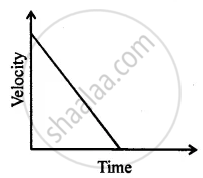Advertisements
Advertisements
Question
A bus decreases its speed from 80 km h−1 to 60 km h−1 in 5 s. Find the acceleration of the bus.
Solution
Initial velocity = 80km/h
= 80 × 100060 × 60
= 22.22 m/s
Time = 5s
Final velocity v = 60 km/h
= 60 × 100060 × 60
= 16.66 m/s
Acceleration = `"Change in velocity"/"Time taken"`
= `"(Final velocity - Initial velocity)"/"Time taken"`
= `(16.66-22.22 )/5`
= -1.11ms-2
Hence, acceleration of the bus = -1.11ms-2
APPEARS IN
RELATED QUESTIONS
Give one example of a situation in which a body has a certain average speed but its average velocity is zero.
Explain why, the motion of a body which is moving with constant speed in a circular path is said to be accelerated.
Find the initial velocity of a car which is stopped in 10 seconds by applying brakes. The retardation due to brakes is 2.5 m/s2.
A body starting from rest travels with uniform acceleration. If it travels 100 m in 5 s, what is the value of acceleration ?
A bus was moving with a speed of 54 km/h. On applying brakes it stopped in 8 seconds. Calculate the acceleration.
A car is travelling along the road at 8 ms-1. It accelerates at 1 ms-2 for a distance of 18 m. How fast is it then travelling ?
For a uniformly retarded motion, the velocity-time graph is _____________
What do you understand by the term acceleration?
Can you suggest a real-life example about the motion of a body from the following velocity – time graph?

A packet is dropped from a stationary helicopter, hovering at a height ‘h’ from ground level, reaches the ground in 12s. Calculate
- the value of h
- final velocity of packet on reaching the ground. (Take g = 9.8 ms−2)
